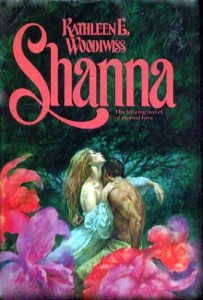 When I first read Shanna I was ten or eleven years old. It’s been an exceedingly long time since then. Kathleen E. Woodwiss was my gateway to full length historical novels but she’s also a deeply problematic read. In the context of the books being published around her, Woodiwiss was revolutionary in her single partner focus. Multiple partners were pretty much the norm in full length Historicals of the mid-1970’s. Single partner situations were more likely to be found in Regency, Gothic or Category titles. (I can think of only a handful of contemporaries I’d say worked the same lane as Woodiwiss, among them Johanna Lindsey and Laurie McBain.)
When I first read Shanna I was ten or eleven years old. It’s been an exceedingly long time since then. Kathleen E. Woodwiss was my gateway to full length historical novels but she’s also a deeply problematic read. In the context of the books being published around her, Woodiwiss was revolutionary in her single partner focus. Multiple partners were pretty much the norm in full length Historicals of the mid-1970’s. Single partner situations were more likely to be found in Regency, Gothic or Category titles. (I can think of only a handful of contemporaries I’d say worked the same lane as Woodiwiss, among them Johanna Lindsey and Laurie McBain.)
I opened Shanna remembering only one scene clearly, and it turns out not to be in the book at all. What I recalled is part of one scene attached to another, from totally different sections. (Caveat – I’m reading a current e-book version of Shanna. I have no idea if the publisher has made changes to the original text or not.) Shanna is a glorious disaster. We lurch from British prisons to tropical plantations to pirate strongholds to Colonial America with barely a care for logistics or sense. There’s corruption, murder, betrayal and a strong sense of Shakespeare tossed in this blender. It’s also Woodiwiss’s first swing at the leads not meeting through rape. Shanna is all about consent, 70’s style.
Pack a snack, we’re going in on an epic vintage read.
Shanna Trahern’s plantation owning father has sent her off to husband hunt in England. Under an ultimatum, Shanna plans to outwit her father by marrying a condemned man with a suitable noble name. The way she sees it, she can bribe the prison to make his last days more pleasant and he can grant her the freedom of widowhood. Unfortunately her chosen groom would also like to get laid. Shanna says sure, why not, with no intention of following through. Here’s a bizarre quote from Shanna’s secret uncle / servant.
“He chuckled to himself as he recognized that here was a man who just might match Shanna Trahern for spirit. It might prove damn good sport to see his mistress nose to nose with this one.“ – Shanna by Kathleen E. Woodiwiss, Chapter Two
I’m not really sure why Shanna’s uncle (we find this out at the close of the book) is working as an family employee or keeping the relationship secret. It seems like Woodiwiss changed her mind about the relationship in the final pages but never read back to see if it all fit together. Basically everyone thinks Shanna is a bitch, including her husband.
“Everything displeased her, and even the flawlessness of her own beauty, regally gowned in rich ivory satin and costly lace, did not change her mood of discontent.” – Shanna by Kathleen E. Woodiwiss, Chapter Nine
Shanna has a real role reversal as for the majority of the book all the power and agency is the heroine’s. Ruark is limited sometimes by choice but often by circumstance. Here he’s planning to sleep with his wife despite her servant telling him to take a hike.
“That is my wife, whatever else you may think. Now, I am not a man to start a quarrel with another in such a place as this, but I’ll leave you this word of advice. If you intend to stop me from giving Shanna my attention, you’d best draw your pistol now and be done with it. I have naught to lose, and she’s worth whatever fight you’d give me.” –Shanna by Kathleen E. Woodiwiss, Chapter Two
He’s totally unsuccessful as Shanna planned for this and has people waiting to take him off her hands. Things are going perfectly for Shanna until her father’s buyer of slaves and servants, the money hungry Ralston, picks Ruark up from death row as new cargo. Her uncle / servant is given a fake body to bury but decides not to let his niece know her new husband is headed for her island home. As you do.
Ruark quickly befriends Shanna’s father and becomes his go-to white slave. (Sorry, indentured servant.) Turns out Ruark is from a vastly wealthy family that he never sends word to. He also never informs Shanna’s dad they got married or that he was on death row when they met. Instead he sneaks around and tells her she totally owes him some husbandly rights while her dad chews her out for not warming up his favorite toy. Shanna predictably falls into bed with her man, then feels betrayed when she catches sight of him with another. (Don’t worry, that girl gets murdered.) Shanna runs to her uncle and begs him to sell Ruark to the pirates. He totally does.
Here’s a shocker – when you make a deal with pirates, they don’t always stick to the plan. Soon Ruark and Shanna are captive together and facing all sorts of dire peril on the pirate’s island where kids get raped and bitches get served. Oh! Wait! I forgot!!! Shanna’s dad is that overly indulgent Good Slaver! He gives Ruark raises like every five minutes and invites him over to dinner constantly. The pirates hate Trahern for totally random reasons and – well check these quotes out.
“My father is much a commanding person. He told my mother she would marry him and threatened her with ravishment if she refused” – Shanna by Kathleen E. Woodiwiss, Chapter Three
“These were the ones the squire valued, and he had often voiced his objection to a man taken into bondage against his will and had sternly instructed Ralston along these lines.” – Shanna by Kathleen E. Woodiwiss, Chapter Four
When the pirates report Father Trahern is a right bastard Shanna and Ruark know it to be untrue. Sure he threatened to rape his future wife, but he told his buyer of humans to stop buying unwilling ones! It’s just bad business! Trahern totally gets consent! He ordered his daughter to marry and procreate because he loves her, not because he’s a controlling freak!
As it turns out the pirates are not only murdering rapist thieves, but also have extremely poor hygiene. Shanna is not about that life so they have to escape. Soon we’re moving on to declarations of love as Shanna agrees she’s been unreasonable about everything.
“ ’Tis the same problem every woman faces: when to give up the dreams of childhood and face the realities of life.” – Shanna by Kathleen E. Woodiwiss, Chapter 13
By this point Ruark is kinda like WTF-ever, babe.
“A worthy man would seek that gentle dame who with calm and sweet repose would thus enrich his life. Have you then so greatly enriched mine?” – Shanna by Kathleen E. Woodiwiss, Chapter 18
Shanna is like, wow, no, guess I haven’t. It’s all cool though because Shanna, Ruark and dad are off to Colonial America for completely random reasons. There Ruark will reveal that he’s rich, connected to English nobility that could have saved him from death row at any second (don’t ask questions) and that the very person who framed him for murder is now in the very same American town along with the very judge who sentenced him and they are father and son. (I! Know!) the judge’s kid also murdered the chick Shanna had no reason to be jealous of, because this is prior to reliable birth control and a dude’s gotta do what he can to avoid having baby mommas.
The shrew thus tamed, Shanna settles in to give her father grandchildren amid the newly revealed luxury of her indulgent American (likely slave owning) family. Her father gets his chief engineer back and the aristocratic connections he craved. Shanna’s mother stays dead and the pirates… well I can’t spoil everything, now can I? Shanna was an almost completely different book than I recalled but still a glorious mess of late-70’s excess.

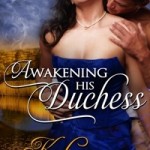
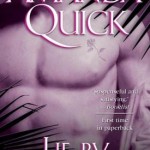

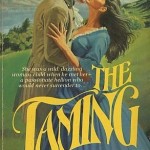




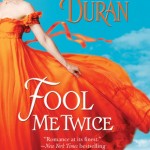



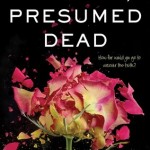

I have a similar memory problem with these old skool books, probably because I read the majority of them around the same age and they did tend to blend together. The thing I miss about them is the broad canvas and the possibilities open to the heroine. She’s never on a straight path to the hero. It’s almost heresy these days for heroines to pursue anything except the hero, but for me the HEA is always more satisfying after a few adventures and possibly other potential love interests, because then I know the heroine is actually choosing the hero–not just defaulting to the only man in the book. I need to re-read this one, because with hindsight I’m realizing that Woodiwiss was probably borrowing heavily from Sabatini and Farnol in her pirate plotting and I’m always intrigued by the way romance takes male-protagonist genre fiction and repurposes its plots for a heroine.
It’s interesting what I’ll excuse in the 70’s stuff – just the sheer why doesn’t he call Uncle Marquess in aspect would DNF a modern book. Shanna is carrying a lot of influences, it’s her most interesting book, if not the most succesful as a narrative.
I never read romance until recently (unless you count a Mary Stewart or a few Phyllis Whitney gothic romances), but I too would prefer it if the genre were not so all-fired focused on one man all the time as a protagonist as opposed to a selection of them from whom the female MC chooses. I wouldn’t want every book to be like that, but I also don’t want zero books to be like that.
But mostly what this does is reinforce my belief that the unspoken purpose of 90-95% of the genre is to reconcile its readers to the effects of patriarchy. (I don’t think the genre’s essentials have changed as much in the meantime as people think it has.) This book — especially that next-to-last quote about facing the realities of life — could be Exhibit A.
I totally agree – there is a definite flip to the romance coin that’s about coming to terms with patriarchy. It’s less overt than it was, but it (along with classism) holds strong.